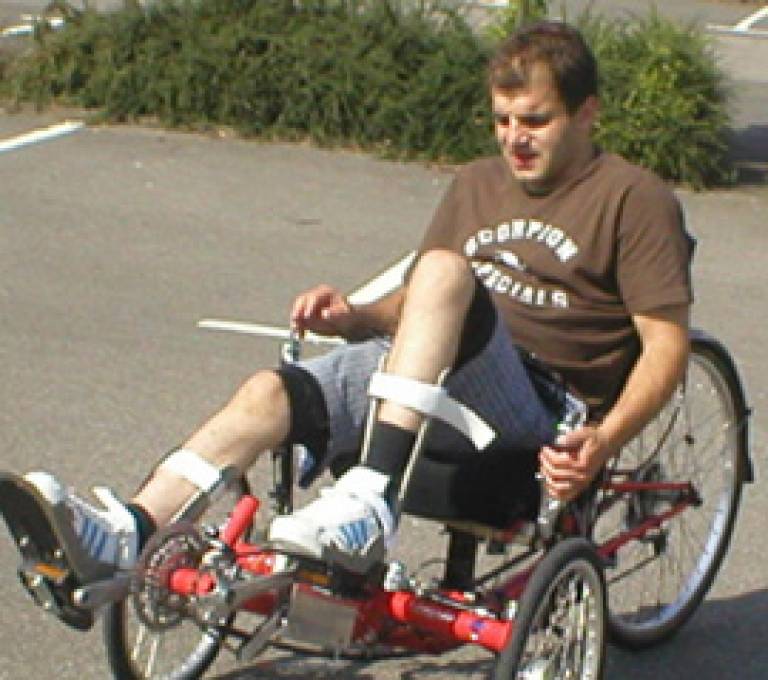Knowledge transfer success for UCL
28 June 2005
The Knowledge Transfer Partnerships (KTP) scheme has successfully brought together a number of academic experts, graduates and companies over the last seven years for the creation and implementation of practical applications of academic research.
 UCL's latest grant - an
award to work with Spirogen Ltd on drug discovery screening tools and
gene targeting technology - brings the total brought into UCL
departments over the £5million mark from around 40 projects.
UCL's latest grant - an
award to work with Spirogen Ltd on drug discovery screening tools and
gene targeting technology - brings the total brought into UCL
departments over the £5million mark from around 40 projects.
An initiative from the government's Department of Trade and Industry (DTI), KTPs facilitate the application of academic expertise and knowledge for the direct, tangible benefit of business through innovative projects undertaken by recent graduates under the joint supervision of the business and academic staff involved.
Projects can last between 12 and 36 months, and must be identified as central to the company's future commercial development. Businesses benefit from government funding, innovation and technology transfer, which results in increased profits, and investment in training, research and development. Businesses contribute either 40 or 60 percent of the overall cost of the partnership, depending on the size of the enterprise.
Mr Duncan Bull is UCL's Manager for KTP. He said: "We select the projects and companies we work with very carefully, as the proposals are subject to a thorough vetting process. As a result, we have an almost 100 percent success rate for bids put to the DTI. There are nine submission dates during the year, and proposals are answered within three weeks, so turn around is quick and new projects are always starting. Currently there are seven UCL projects and we're hoping to have at least ten by the end of 2005."

Once a company has identified a strategic development project, they can approach an academic or university directly or through the DTI. The proposal, prepared jointly by the company and the university, is examined and approved by groups nominated by the DTI. Once approved, the university employs a graduate with either a masters degree or a minimum 2.1 first degree, who is known as the KTP associate and who will manage the project. Although under university employment, the associate must spend his or her time at the company. An academic supervisor pays regular visits to the company.
Mr Bull only considers challenging proposals and is convinced that, since neither party gets value for money on a short-term project, academics should consider only 24 to 36 month projects. "There's no point in working with a company that manufactures red widgets who just want to make blue ones. There is no element of academic challenge in this unless the company is interested in innovative manufacturing techniques. It takes at least seven months for the associate and company to get to grips with the project, not forgetting additional transferable skills training for the associate."
Mr Bull explains: "Benefits for the academic include the opportunities for publishing papers - UCL average over two per associate, compared to the UK average of about one - the development of opportunities for other research work and, relevant to this moment in time, KTP grants are included as part of the Research Assessment Exercise."
On completion of the project, associates often gain employment with their commercial partner or go on to study for a PhD, basing their thesis on the project.
"Eight years ago, nobody at UCL had heard of this scheme," recalls Mr Bull. "When I started at UCL, I represented UCL's Centre for Advanced Instrumentation Systems and I spoke to many companies who expressed a need for a partnership of this nature, but could not afford the consultancy fees. The first KTP partnership at UCL was at the suggestion of a company who was keen to work with us, and after a successful project, it grew from there."

There are currently 950 KTP projects nationwide, but currently there is a funding capacity for 1,050. "The scheme is far from oversubscribed," says Mr Bull. "It's one of the best kept funding secrets, so we're looking to raise UCL's projects to 15 running simultaneously, which I would say is our capacity."
Leading by example
UCL-Finetech Medical Ltd
Finetech manufacture surgical and medical implants and their simulation controllers, which are used mainly for patients with spinal cord injury or stroke. The objective of this partnership with UCL's Implanted Devices Group is to design and CE-Mark (a manufacturer's declaration that the product complies with the EU's product directives) a muscle simulator for commercial production as part of a system to enable people with paralysis of one or both legs to pedal a recumbent tricycle for their health and recreation. More…
UCL-Environmental Building Solutions Ltd (EBS)
Led by Professor May Cassar of UCL's Centre for Sustainable Heritage, this partnership developed new mechanisms for data analysis of large quantities of environmental data and to utilise computer modelling of the historic built environment to extend company-based expertise and markets. In this study, building simulation tools were used to model a 1,000 year-old church and evaluate the effectiveness of the tools for the company's requirements. EBS is now promoting building simulation as a means of developing sustainable solutions for the conservation and adaptation of European cultural heritage.
UCL-Camden Primary Care Trust
UCL's Professor Paul Longley, of the Centre for Advanced Spatial Analysis, is the lead academic on this project with Camden's PCT. The aim is to develop a geodemographic database of health and wellbeing in Camden, and use this to ensure that health services such as breast screening are provided by the PCT according to greatest need. This is also involving mapping the Geography of the Ethnic Origins of Names (GEONome). More…
Images: Top - The recumbent tricycle in action. Middle - Interior of St Peters Church, the model for the EBS-UCL partnership. Bottom - Expected rates of non-responders to calls for breast screening in Camden.
To find out more about KTP use the links at the top of this article or contact Mr Duncan Bull.
Links:
KTP at UCL
KTP
 Close
Close

